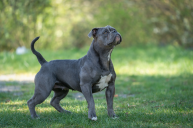Known for being small and sweet, Boston terriers and French bulldogs are both one of the most beloved small dog breeds in the United States. Don't believe us? According to the American Kennel Club's yearly list of popular dog breeds, the Boston terrier ranks 23rd, while the French bulldog comes in second. And it's easy to see why! Their size makes them perfect for apartment or condo living, while their loving nature makes them an excellent dog for first-time owners. Though they may seem like nearly the same breed, these pups aren't at all identical.
Here are the differences between a Boston terriers vs. French bulldog. Understanding the breeds will help you decide which one you want to bring home!
Origins of the Breeds

According to Dog Time, the first Boston Terrier, known as Judge, was a crossbreed between an English Bulldog and the now extinct English WhiteTerrier. As their name suggests, Boston Terriers were created by breeders in Boston, Massachusetts. But the pup hasn't always been known by its home city. Boston Terriers were previously known as Rounds Heads, Bullet Heads, and Bull Terriers. They were also dubbed the American Gentleman, which has stuck around as a nickname.
Surprisingly, the French Bulldog, though popular in France, is not from there. The French Bulldog, or Frenchie, was bred in England, and shares ancestry with the Boston Terrier through the English Bulldog. The small dogs became popular with lacemakers, who eventually brought them over to France when they came looking for work.
According to the American Kennel Club, they were often seen in the working-class neighborhood of Pairs called Montmartre, where there were many, many brothels. One of the more popular accessories of the French ladies of the night were these cute, short-haired dogs. The association became so strong that the dogs even began to grace postcards with their risque counterparts in the late 19th century and into the early-19th century. Soon after, Frenchies found favor with royalty, including the Grand Duchess Tatiana Romanov.
As time went on, Americans visiting Europe became enamored with the breed and brought them to the United States. As a result, the French Bulldog Club was established and set the standard for Frenchies everywhere.
Boston Terrier vs. French Bulldog

RELATED: What's the Difference Between a Labradoodle and Goldendoodle?
The Boston terrier is known for its tuxedo-like coat—white fur on the chest and front legs, black everywhere else. The pup is also recognized by its pointy ears, big eyes, and flat face. According to the American Kennel Club, Boston terriers are about 15 inches tall and can weigh anywhere from 10 to 25 pounds, though most fall between 13 and 16 pounds. Their coat does not shed very much, making the clean up easier.
Much like the Boston terrier, French bulldogs have bat ears that stand straight up and a flat face. But while Boston terriers have a universal coat, French bulldogs come in various colors including brindle, white, and fawn. These short coat dogs are muscular but compact. Frenchies are between 11 and 13 inches tall and weigh around 28 pounds or less. French bulldogs do not shed a lot but require weekly brushing to encourage new hair growth and spread out their natural oils.
Boston Terrier and French Bulldog Traits, Lifespan, and Health Issues

Boston terriers are protective but playful pups that love to be around new people. They have relatively high energy levels, which makes playtime a must.
French bulldogs, on the other hand. They have moderate energy levels, meaning they don't require much exercise but they need mental stimulation and a nice walk to be happy. Frenchies do well in agility, rally, and obedience sports—but not when it is humid or hot. They should also avoid water sports, since they are chest-heavy dogs. Like the Boston terrier, Frenchies are known for their affectionate nature but have a more balanced disposition. Both breeds do well with early socialization and positive reinforcement during training.
When it comes to health conditions, the French bulldog unfortunately has many. As a brachycephalic breed, they have short snouts and flat faces. This makes it difficult to breathe, especially if they're hot, over exercised, or stressed—the latter of which is likely exacerbated by separation anxiety, which is common among French bulldogs. Frenchies are also at a higher risk for spinal problems, allergies, and autoimmune disorders. They are also prone to eye conditions such as juvenile cataracts, cherry eye, and entropion. Despite the numerous health conditions, Frenchies can live a relatively long life: the average life expectancy of a healthy French bulldog is between 10 and 12 years.
The Boston terrier has similar health issues, such as difficulty breathing, eye conditions, and separation anxiety. Boston terriers are also at high risk for deafness, which is something a responsible breeder will screen for, as well as corneal ulcers and glaucoma. The average lifespan of a Boston terrier is 11 to 13 years.
Do you have a Frenchie or a Boston Terrier? Tell us on our Wide Open Pets Facebook page.




